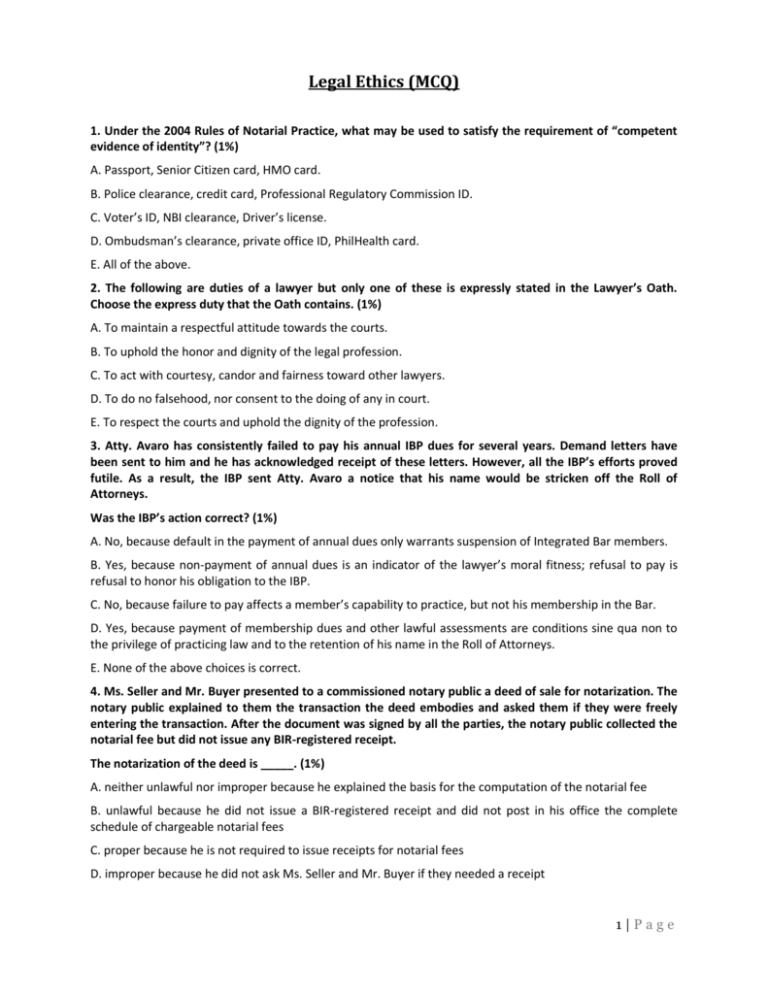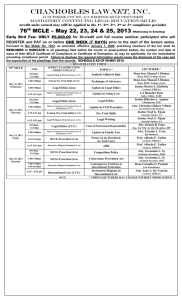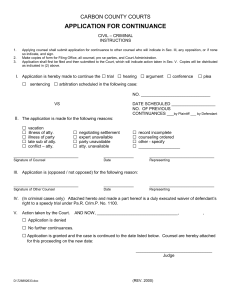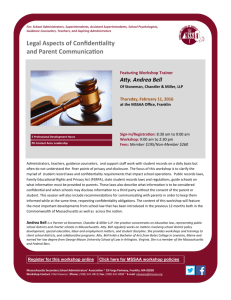Legal Ethics Bar Exam Questions 2013 MCQ
advertisement

Legal Ethics (MCQ) 1. Under the 2004 Rules of Notarial Practice, what may be used to satisfy the requirement of “competent evidence of identity”? (1%) A. Passport, Senior Citizen card, HMO card. B. Police clearance, credit card, Professional Regulatory Commission ID. C. Voter’s ID, NBI clearance, Driver’s license. D. Ombudsman’s clearance, private office ID, PhilHealth card. E. All of the above. 2. The following are duties of a lawyer but only one of these is expressly stated in the Lawyer’s Oath. Choose the express duty that the Oath contains. (1%) A. To maintain a respectful attitude towards the courts. B. To uphold the honor and dignity of the legal profession. C. To act with courtesy, candor and fairness toward other lawyers. D. To do no falsehood, nor consent to the doing of any in court. E. To respect the courts and uphold the dignity of the profession. 3. Atty. Avaro has consistently failed to pay his annual IBP dues for several years. Demand letters have been sent to him and he has acknowledged receipt of these letters. However, all the IBP’s efforts proved futile. As a result, the IBP sent Atty. Avaro a notice that his name would be stricken off the Roll of Attorneys. Was the IBP’s action correct? (1%) A. No, because default in the payment of annual dues only warrants suspension of Integrated Bar members. B. Yes, because non-payment of annual dues is an indicator of the lawyer’s moral fitness; refusal to pay is refusal to honor his obligation to the IBP. C. No, because failure to pay affects a member’s capability to practice, but not his membership in the Bar. D. Yes, because payment of membership dues and other lawful assessments are conditions sine qua non to the privilege of practicing law and to the retention of his name in the Roll of Attorneys. E. None of the above choices is correct. 4. Ms. Seller and Mr. Buyer presented to a commissioned notary public a deed of sale for notarization. The notary public explained to them the transaction the deed embodies and asked them if they were freely entering the transaction. After the document was signed by all the parties, the notary public collected the notarial fee but did not issue any BIR-registered receipt. The notarization of the deed is _____. (1%) A. neither unlawful nor improper because he explained the basis for the computation of the notarial fee B. unlawful because he did not issue a BIR-registered receipt and did not post in his office the complete schedule of chargeable notarial fees C. proper because he is not required to issue receipts for notarial fees D. improper because he did not ask Ms. Seller and Mr. Buyer if they needed a receipt 1|Page E. proper because any irregularity in the payment of the notarial fees does not affect the validity of the notarization made 5. In order to comply with the MCLE requirements, Atty. Ausente enrolled in a seminar given by an MCLE provider. Whenever he has court or other professional commitments, he would send his messenger or a member of his legal staff to register his attendance at the MCLE sessions so he could be credited with the required qualifying attendance. He would also ask them to secure the printed handouts and the lecturers’ CDs, all of which he studied in his free time. Atty. Ausente should be _____. (1%) A. required to make up for his absence by attending lecture sessions in other MCLE providers B. sanctioned because he circumvented or evaded full compliance with the MCLE requirements C. excused because he attended to profession-related tasks, and fully studied the courses through the materials and CDs he secured D. penalized by forfeiting all his earned MCLE units E. excused because attendance by proxy is a widespread and tolerated MCLE practice 6. Plaintiff Jun Ahorro filed a complaint for collection of sum of money before the Regional Trial Court of Manila. Because of the large amount of his claim, he had to pay a sizeable docket fee. He insisted on paying the docket fee and other fees in installments because staggered payment is allowed under Rule 141, as amended. The Office of the Clerk of Court (OCC) refused to accept the complaint unless he paid the full amount of the docket and other required fees. Plaintiff Jun Ahorro’s position _____. (1%) A. is allowed because of the large amount of the docket fee B. is justified because it is discretionary on the part of the OCC to accept staggered payment C. is incorrect because the amendment on staggered payment has been suspended D. is not allowed because the full payment of docket fee is jurisdictional E. cannot be allowed because of its prejudicial impact on the judiciary’s financial operations 7. Atty. Anunciante is engaged in the practice of law and has a regular, live, weekly TV program where he gives advice to and answers questions from the audience and program viewers concerning U.S. immigration problems. Occasionally, advertisements inviting viewers to watch his TV program are shown outside his regular program schedule. Because of the popularity of his TV program, the number of his law practice clients increased tremendously. The TV program of Atty. Anunciante is _____________. (1%) A. permissible because it is public service in nature B. objectionable because the work involves indirect advertising or solicitation of business C. improper because it gives him an unfair advantage over other lawyers D. ethically allowable because it does not violate the traditional standards of the legal profession E. None of the above. 8. Vito is a notorious gangster in the province who has been accused of raping and mercilessly killing a 16year old girl. Sentiments run very strongly against him and the local Bar Association met and decided that no lawyer in the locality would represent him. Vito could not afford the services of an out-of-town counsel. Choose the most appropriate legal and ethical characterization of the decision of the local Bar Association. (1%) 2|Page A. It is within its right to make, since lawyers may freely decide who to represent and who not to represent. B. It is unethical; it constitutes a collective denial of Vito’s right to the assistance of counsel. C. It constitutes an anticipated act of contempt towards the court that may order any of the members of the association to represent the accused. D. It must be concurred in by each member of the Bar Association to have any binding force. E. It is unethical because the Bar Association already prejudged Vito. 9. Graft Investigator Atty. Retirada served the Office of the Deputy Ombudsman for eight years before retiring from the service. While still a Graft Investigator, she investigated a government contract for office supplies where Mr. Sakim was the supplier. The transaction was supposedly overpriced. Atty. Retirada recommended that no charges be filed against the officials involved and the recommendation benefited Mr. Sakim as the supplier involved in the transaction. After her retirement from the service, Atty. Retirada’s services as counsel were engaged by Mr. Sakim as counsel to represent the Sakim family in a claim against the State arising from a family property that had been expropriated. Atty. Retirada now consults you about the ethical permissibility of accepting the engagement. What advice would you give Atty. Retirada? (1%) A. Having been in government service, she cannot now represent a party with a claim against the State. B. Having once handled a case involving her prospective client, a conflict of interest would exist if she were to accept the engagement. C. Representing the Sakim family would involve the unethical use of information she obtained while in government service. D. There is no ethical objection to her acceptance of the engagement because the case is neither criminal nor administrative in character. E. Acceptance of the engagement should be on condition that Atty. Retirada would withdraw if a conflict of interest situation arises. 10. Your client is the plaintiff in a civil case for damages arising from a car accident where he sustained serious physical injuries and damages amounting to P1Million. The counsel for the defendant asks you to give him a proposed amount for purposes of settlement and you are aware that whatever amount you tell him would not readily be accepted and would probably be cut into half. What is your best legal and ethical course of action? (1%) A. Inflate your proposal to make allowances for a compromise. B. Tell the defendant’s counsel the correct amount of damages. C. Offer him a reasonably low amount so that the case can immediately be settled. D. Ask the defendant’s counsel to first submit his negotiating figure. E. Play hard-to-get and initially refuse all the defendant’s initiatives to settle. 11. Candido engaged the services of Atty. Lebron in a criminal case. In the course of their consultations, Candido admitted to Atty. Lebron that he committed the crime and in fact actively planned its commission. He stressed, however, that under no circumstance would he admit or confess to the murder charge he is facing and, in fact, would enter a plea of “not guilty” on arraignment. If Candido insists on his planned plea, Atty. Lebron should___________. (1%) A. discontinue his representation; to continue would be unethical since he would then be aiding the accused in foisting a deliberate falsehood on the court 3|Page B. allow Candido to choose his course of action; Atty. Lebron’s duty is to protect all his legal and statutory rights C. convince Candido to plead guilty and withdraw from the case if Candido refuses to heed his advice D. file a manifestation, if Candido pleads “not guilty,” declaring to the court what he knows of the truth. E. play matters by ear and wait for developments as Candido may still plead guilty. 12. A Regional Trial Court issues a temporary restraining order (TRO) halting the demolition order issued by the City Mayor who has long loathed the cluster of shanties put up by informal settlers along the road leading to the city’s commercial district. The TRO, however, carried conditions that must be in place before the threatened demolition can be fully halted. The city legal officer advised the City Engineer’s Office and the local PNP chief that the TRO’s conditions are not in place so that the demolition could proceed. The city filed a manifestation reflecting the city legal officer’s position, while the informal settlers’ counsel sought its own clarification and reconsideration from the court, which responded by decreeing that the conditions have been fulfilled. Despite this ruling, the city legal officer insisted that the conditions have not been fulfilled and thus gave the PNP clearance to aid the City Engineer’s Office in proceeding with the demolition. From the perspective of professional ethics, how would you characterize the city legal officer’s actions? (1%) A. It is unethical since he counseled civil servants to disregard a court order. B. It is ethical, since he acted in accordance with his honest conviction after considering that the court’s conditions have not been met. C. It constitutes indirect contempt, but the lawyer cannot be disciplined because he acted out of his firm and honest conviction. D. It is neither contemptuous nor unethical since he was performing his duties as city legal officer. E. It is unethical since the City Legal Officer was simply blindly following the Mayor’s wishes. 13. The mediator assigned to a civil case happens to be your law school classmate and he makes a doctrinal statement about the rights of the parties. You knew that the statement, although favorable to your client’s case, is incorrect. The ethical move to make under the circumstances is to ________. (1%) A. correct the mediator and state the right doctrine B. just keep quiet because the other counsel might learn about your relationship with the mediator C. reveal your relationship with the mediator and ask the opposing counsel if he has any objections D. request the Mediation Supervisor to immediately change the mediator E. simply withdraw from the case because of the unfair advantage that you enjoy 14. Wanda finally became pregnant in the 10th year of her marriage to Horacio. As her pregnancy progressed, she started having difficulty breathing and was easily fatigued. The doctors diagnosed that she has a heart congestion problem due to a valve defect, and that her chances of carrying a baby to full term are slim. Wanda is scared and contemplates the possibility of abortion. She thus sought legal advice from Diana, a lawyer-friend and fellow church member, who has been informally advising her on legal matters. What is Diana’s best ethical response? (1%) A. Beg off from giving any advice because it is a situation that is not purely legal. 4|Page B. Advise Wanda on the purely legal side of her problem and assure her that abortion is allowed by law if the pregnancy endangers the life of the mother. C. Advise that it is a religious problem before it is a medical or legal one, and Wanda should consult and follow the advice of her religious confessor. D. Advise Wanda that abortion, above everything else, is a moral problem and she should only have an abortion if it is an act she can live with. E. Refrain from giving any kind of advice as abortion is a serious matter that cannot be resolved through informal consultations with friends and fellow church members. 15. Based on the same facts as Question XIV, assume that Diana, aside from being a family friend of the couple, has been formally and informally acting as their lawyer in all their personal and family affairs. She has represented them in court in a case involving a car accident and in the purchase of their family home, for which they formally paid the attorney’s fees that Diana billed. In this instance, Wanda asked about her legal rights but did not formally ask for a written opinion from Diana. Horacio never had any input on the query as he was then away on an out-of-town trip for his office. Diana advised Wanda that she is fully protected in law and her best course of action is to have an abortion while her pregnancy is not yet far advanced. Did Diana violate the prohibition against representing conflicting interests when she provided legal advice to Wanda without Horacio’s knowledge? (1%) A. Yes. The decision of whether to have an abortion should be decided by both spouses; thus, Diana should not have provided legal advice in the absence of Horacio whose concerns and positions are unknown to her. B. No. Diana did not give any formal advice that would constitute legal practice calling for the strict observance of the conflict of interest rules. C. No. The decision on whether or not to have an abortion lies solely with Wanda; it is her body and health that is in issue. D. No. Horacio and Wanda are married, any advice given to Wanda is deemed to have been given to Horacio as well. E. No. Giving advice to Wanda is not necessarily acting against Horacio’s interest; Diana was giving advice based on the couple’s best interest 16. ABLE Law Office has a retainer agreement with Santino, a business man with shady connections, who has recently been charged with laundering money for an illegal drugs syndicate using Cable Co., Santino’s holding company. The lawyers of ABLE Law Office assigned to handle Santino’s account have been impleaded as co-defendants for incorporating and actively handling the affairs of Cable Co. In its bid to strengthen its case against the defendants, the prosecution approached you (as the least guilty defendant who would qualify for a discharge as a state witness) and offers to make you a state witness. Can you accept, within the bounds of professional ethics, the prosecution’s offer? (1%) A. No, as Santino’s lawyer you are duty-bound to protect his interests, ably represent him in court, and not turn against him. B. Yes, as an officer of the court, you have the duty to disclose to the court information crucial to the case. C. No, the information you acquired involving the criminal case against Santino is covered by the privileged communications rule. D. Yes, a lawyer may testify against his client provided he first severs the lawyer-client relationship. 5|Page E. Yes, the law of self-preservation is akin to the law of self-defense and stands higher than any obligation you may have with your client 17. Under the same essential facts as the preceding Question XVI, assume that you have resigned from ABLE Law Office and that you were never impleaded as a co-defendant, but during your stay with the firm, you assisted in handling the Cobra Co. account, which is largely owned by Cable Co. The prosecutor handling the case against Santino and the law firm asks you, as a former law firm member, if you can help strengthen the prosecution’s case and hints that you, too, may be impleaded as a codefendant if you do not cooperate. What is your best legal and ethical course of action? (1%) A. Offer to testify on what you know and provide evidence against the defendants in exchange for a guarantee of immunity from prosecution in the case. B. Offer to provide evidence against Santino, but clarify that you cannot testify against Santino because of the privileged communications rule C. Decline to testify against the defendants and to provide evidence in the case as the attorney-client privilege lasts even beyond the termination of the relationship. D. Decline to testify against the defendants as whatever information you acquired from Santino and Cable Co. in the course of the lawyer-client relationship is privileged. E. Alert the law firm to the prosecution’s offer so that they can prepare for the evidence within your knowledge that the prosecution may use 18. You are a lawyer working in the Public Assistance Office. Yolly, a key witness in the case (reckless imprudence resulting in homicide) you are handling, is indigent and illiterate. While Yolly is willing to testify in court, you worry that the judge might not be able to appreciate the impact of her testimony, as she has a difficult time answering English questions. You also worry that this might affect her credibility. Further, Yolly has indicated that she might not have the money to pay the fare to attend the trial. You are presenting her as a witness for the defense at the hearing next week. Which of the following is NOT a permissible act for you to do? (1%) A. Provide Yolly with money for fare to ensure her attendance in court. B. Interview Yolly before trial, so that she will be more at ease when she testifies before the court. C. Prepare a judicial affidavit of Yolly’s testimony, which she will then verify before the court. D. Provide her with sample questions that you might ask in the hearing tomorrow. E. All the above are permissible 19. You are a lawyer working at the Office of the Special Prosecutor and you are part of the team handling the case against former Senator Avido who is charged with plunder. Based on your assessment of the evidence that the complainant Linda submitted, you know that the case against former Senator Avido is weak, although you instinctively feel that he is guilty. You inform your friend Atty. Curioso (who works with the office of Senator Elmismo, a known political rival of Senator Avido) regarding your instinctive feeling about Senator Avido. Atty. Curioso springs a surprise by giving you a recording of the wiretapped conversation between Senator Avido and Napo, a private party co-accused, about the transaction complained of and how they would split the proceeds. What will you do under these circumstances? (1%) A. Disregard the wiretapped conversation as it is inadmissible and will not serve any useful purpose in the trial of the case. 6|Page B. Present the wiretapped conversation in court; although in admissible, its introduction and the disclosure of its existence is a right that the public is entitled to. C. Leak the wiretapped conversation to the media, to let the public know what really happened. D. Submit the wiretapped conversation to the Senate which is in the best position to determine what to do with it. E. Let Napo privately know, through 3rd parties, that you are aware of the existence of the taped conversation, with the hint that he can still hope for a lighter penalty if he would cooperate 20. Armin, holding a transfer certificate of title to a lot in downtown Calamba in the name of Bobby, shows you the title and claims that Bobby sold him the lot. He then asks you to draft a deed of sale covering the transaction. In reply to your query on where Bobby is, Armin explains that Bobby is currently out of the country but he (Armin) has his general power of attorney which he also shows to you. The power of attorney empowers Armin to do everything that Bobby can do with the Calamba lot, but you note that it does not specifically authorize Armin to sell the property. Armin also assures you that he wants the deed of sale drafted so he can send it to Bobby for his signature even while overseas. How will you act under the given circumstances? (1%) A. Agree to draft the deed of sale, subject to your usual 10%commission. B. Refuse to draft the deed of sale, as Armin has not presented a special power of attorney that would support the deed that he is asking you to prepare. C. Refuse to draft the deed of sale, as Bobby is not present to sign the deed of sale and verify that he is indeed selling his lot to Armin. D. Agree to draft the deed of sale, since it is only a draft that Bobby still has to consider and sign. E. Refuse to have anything to do with Armin’s request because it is a potentially problematic situation given the price of lots in downtown Calamba. 7|Page



